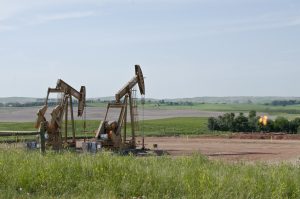By Michael Burger and Romany Webb
 Less than a month after being sworn in as Administrator of the Environmental Protection Agency (EPA), Scott Pruitt has already begun dismantling years of work to curb greenhouse gas emissions. In one of his first official actions, last Thursday, Administrator Pruitt withdrew a request that oil and gas companies provide certain information needed to develop new methane regulations for the industry. The request, which was issued last November, included an operator survey seeking information on the number and types of equipment used at onshore oil and gas facilities and a more detailed facility survey which sought data on methane emissions from equipment leaks and other sources. The operator survey was to be completed by 15,000 companies, while the facility survey was sent to a representative sample of 4,650. Most hadn’t yet responded and now, thanks to the withdrawal, won’t have to. As a result, EPA will remain largely unaware of the companies’ methane emissions, making appropriate regulation of them all but impossible. That’s bad news for anyone concerned about climate change.
Less than a month after being sworn in as Administrator of the Environmental Protection Agency (EPA), Scott Pruitt has already begun dismantling years of work to curb greenhouse gas emissions. In one of his first official actions, last Thursday, Administrator Pruitt withdrew a request that oil and gas companies provide certain information needed to develop new methane regulations for the industry. The request, which was issued last November, included an operator survey seeking information on the number and types of equipment used at onshore oil and gas facilities and a more detailed facility survey which sought data on methane emissions from equipment leaks and other sources. The operator survey was to be completed by 15,000 companies, while the facility survey was sent to a representative sample of 4,650. Most hadn’t yet responded and now, thanks to the withdrawal, won’t have to. As a result, EPA will remain largely unaware of the companies’ methane emissions, making appropriate regulation of them all but impossible. That’s bad news for anyone concerned about climate change.
Methane emissions are a major cause of rising temperatures and associated climate change. While emitted in smaller quantities than carbon dioxide, methane has much greater near-term effects, trapping 87 times more heat in the earth’s atmosphere per ton in the first 20 years after it is released. Currently, the oil and gas industry is thought to be the second largest source of methane in the U.S. (after agriculture), though the precise amount of its emissions is disputed. EPA has estimated industry emissions at over 8 million metric tons in 2015 (i.e., equivalent to approximately 31 percent of national methane emissions). But other studies have questioned the accuracy of that estimate, with some finding actual emissions to be higher than those reported by EPA, while others have reached the opposite conclusion.
At this point, some readers may be wondering: why all the confusion? Doesn’t EPA collect emissions data from oil and gas facilities as part of its greenhouse gas reporting program? The answer is yes, but there’s a catch. EPA regulations require owners or operators of certain facilities with annual greenhouse gas emissions of 25,000 metric tons or more to file annual reports specifying, among other things, methane emissions from equipment leaks and venting. Notably however, in reporting emissions, facilities generally do not directly measure the size of leaks. Rather, facilities estimate leakage based on historical averages, which were calculated for various categories of equipment back in the 1990s. The averages, known as emissions factors, are multiplied by the equipment count in each category to estimate overall emissions. (Incidentally, a new report published today by the Climate Accountability Institute and CDP (formerly the Carbon Disclosure Project) uses the same methodology to estimate the greenhouse gas emissions of the world’s 50 largest oil and gas companies.)
Recognizing that this approach depends on accurate equipment counts, last November, EPA updated its accounting methods to begin incorporating the latest data on equipment in the field. This led to the revision of past emissions estimates, with the 2013 estimates rising by a massive 27 percent. Nevertheless, many are concerned that the estimates still may not reflect the full scope of emission, primarily because the emissions factors are incorrect.
Seeking to ensure greater accuracy, an unlikely coalition of environmental activists, industry participants, and academics have joined forces in a series of studies, aimed at better understanding the extent of emissions. The Environmental Defense Fund has commissioned 16 studies, each focusing on a different area of oil and gas production, from extraction to processing to storage and transportation. The studies are being conducted in partnership with a number of oil and gas producers, who have provided academic researchers with access to their facilities to measure emissions. They should, therefore, provide more accurate data about the amount and source of emissions. Unfortunately, however, the data is partial in scope, representing only a small fraction of the number of oil and gas facilities in operation nationwide. It may also be skewed towards low emitting facilities, the operators of which are more likely to volunteer for the studies.
Given these data gaps, EPA’s decision to withdraw the information request reflects the agency’s turn away from environmental and public health protection in the public interest. In its letter informing operators of the withdrawal, EPA indicated that Administrator Pruitt “would like to assess the need for the information that the agency was collecting.” It seems, however, he has already made up his mind that collecting the information would impose too great a cost on operators. Yesterday, he told reporters “we’ve withdrawn that [request] after hearing from industry . . . we’re listening to those in industry and how it’s going to impact them.” Arguably, though, any costs to industry would have been outweighed by the long-term climate and clean air benefits of the request.
EPA’s information request would have served an invaluable purpose, shedding much needed light on the oil and gas industry’s contribution to methane emissions. Without the requested information, EPA will be hard pressed to craft an appropriate regulatory response, leaving us all worse off. Moreover, the process of compiling an inventory of covered facilities could well lead to the discovery and possibly the correction of previously unknown leaks. As former EPA Air Chief Janet McCabe observed last week, “[t]he pollution doesn’t just go away because you don’t focus on it, nor do the impacts on the climate go away just because you don’t focus on it.” Ignorance, in this situation at least, is not bliss.
The Sabin Center’s Climate Deregulation Tracker is keeping tabs on this and other measures to undo climate action.


